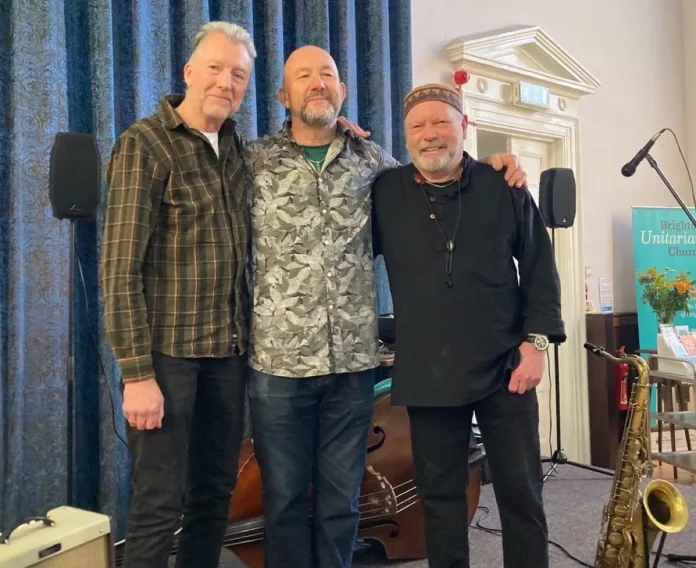
The imposing neo-classical portico of Amon Henry Wilds’s 1820 Unitarian Church, set in the cultural centre of Brighton and Hove at the northern end of New Road (which houses Brighton’s famous Theatre Royal) leads to a chapel-sized space. Fortunately for preachers, speakers and musicians alike, the clean lines and generous ceiling height offer a superb acoustic.
For many years the church has put on lunchtime concerts, usually of classical music but also featuring other genres, including jazz. With a suggested entrance donation fee of £5, a late-November concert offered a must-take opportunity to enjoy music from the deliciously attuned improvising trio of Geoff Hearn (ts, f), Nigel Aubrey Thomas (b) and Hugh Bance (elg, laptop, samples). From first note to last, the near-full house accorded the now meditative, now engagingly grooved music both the keenest attention and a richly enthusiastic response.
A fair few JJ readers will be aware of the respect and admiration I have for Hearn: to date, my October 2020 profile of Geoff (Geoff Hearn: blues in space) has had over 7,000 views. As that profile detailed, Geoff has been active in many an area of music, including the blues, fusion, modern and contemporary mainstream and the free improvisation of the much-lauded Zaum, led by that inspirational drummer, (the late) Steve Harris.
The past few years have seen Geoff focus on a range of diverse, often intimately pitched duo and trio work: music such as the 2020 Root Strata duo release Deep Song (featuring Simon Robinson on keyboards) bridges worlds in what one might characterise as a post-CODONA way.
Long interested in the spiritual and musical traditions of both Zen and First Nation (indigenous, or native) Americans, Geoff opened the concert with some piping upper-register calls from one of the various native American flutes he has collected over the years. Later, he turned to shakuhachi bamboo flute to season proceedings with some sublimated Far Eastern accents and atmosphere. Some mysterious, broadly phrased figures on alto flute offered complementary contrast to various patient and potent passages, as reflective as they were ascensional, of soulful post-Coltrane tenor sax.
Some of the melodically oriented improvisation which distinguished the organically evolving programme was underpinned by an atmospheric, harmonium-like minor drone supplied by Bance. And a wonderful take on a bubbling “call” piece entitled Yuba, by Mary Youngblood – the distinguished native American flautist, composer and social activist – was rounded out by fresh treatments of Pharoah Sanders’s Harvest Time and Joe Henderson’s Earth (the latter from the 1973 Elements with, a.o., Alice Coltrane).
Hearn calls the work of his Akima trio with Bance and Joe Philogene (pc, v) “Free Spirit Music”. And so it was here. The dynamically astute Bance played a key role in setting and sustaining the overall template of meditative focus and spiritual expansion, ad libitum reflection and enticing groove. His diversely employed tampura and tabla loops and touches of Telecaster tone and linearity supplied the sort of colour and texture which spoke of a sensibility as painterly as it was poetic. Best of all, Bance – an accomplished painter whose early turn-ons in music included Bert Jansch, Davy Graham and John Martyn – showed the value of space. Nothing he brought to the music was cluttered or overdone.
The same must be said of the many compelling contributions from Nigel Thomas, in a range of pizzicato and arco lines of consummate quality. A bassist of vast experience, Thomas counts Ray Brown, Paul Chambers and Charlie Haden among his favourites, while having also long been inspired by many a horn player and vocalist, as well as such a blues-and-gospel touched pianist as Hampton Hawes.
Much in tune with the thoughts of Geoff Hearn, what Thomas said to me after the concert summed up what made these 45 or so minutes at the Brighton Unitarian Church so refreshing, so magical. “When we play things like Harvest Time or Earth, of course we respect the structure, or the mood, of the originals. But in essence, the pieces function as springboards for us to take the music… somewhere else, somewhere ‘beyond’. Geoff has spoken of seeking meditative inwardness and spiritual elevation in and through music and as a practising Buddhist, I can only agree.”
“You can debate forever what sort of music might best bring you to such states of consciousness: you probably noticed that our music wasn’t stuffed with harmony, for example, it was more modal in nature. The point with this trio is to get into the sort of space where the notes, the lines, the group interaction, all have the chance – like humans – to realise, or release, the full extent of their potential resonance.”
“Let me put that another way. One of my favourite bassists today is Christian McBride. What a player, with so much musical knowledge and technical capacity! But those things never get in the way of his musicality. And that’s what we’re after, in a register that’s both literate and our own – and which, hopefully, can speak to listeners, giving them the space and time to breathe and enter into – and so help sustain and develop – the music.”
Geoff Hearn, Nigel Thomas & Hugh Bance at Brighton Unitarian Church 24 November 2023















